- Home
- Andrew Marr
A History of the World Page 14
A History of the World Read online
Page 14
Alcibiades and Critias were certainly dangerous men. After the defeat at Syracuse, Athenian democracy had been briefly knocked to one side by the so-called Four Hundred, a group of aristocrats who in 411 BC overthrew the government and briefly took power, a move that led to killings and a climate of fear. Alcibiades was thought to have been involved, and the coup foundered when the plotters fell out. Middle-class and poorer Athenians made common cause, and restored democracy. Then in 404 when Athens was finally defeated by Sparta, democracy fell again, this time under the rule of the Thirty Tyrants, a rich oligarchy led by Critias which suspended the right to vote or have a jury trial for all but a tiny aristocratic minority. This was an altogether bloodier business. They ruled with a Spartan army, Vichy-like collaborators, using gangs of whip-wielding thugs to keep order,30 exiling and executing popular leaders.
Socrates stayed in Athens under the tyrants’ rule, even though many other eminent citizens left for a relatively comfortable exile. He excused himself later by saying he had been ordered by the Thirty to arrest a man for execution, but in fact he slipped away and left the job to others – hardly the action of a heroic resister. Once more, middle-class hostility triumphed, the Thirty were ousted, and democracy returned. But by the time of Socrates’ trial, a mere four years later, the Athenian regime must still have seemed to be teetering, and Socrates was not its friend.
His death was a tragedy, not because he had the answers to the key philosophic conundrums of the ancient world, but because it showed that even in this relatively open society the greatest minds could not always express themselves freely or follow their thoughts wherever they led. The most pressing problems for would-be democracies and open societies – and Athens was really more the latter than the former – have never been about the minutiae of voting systems, or even about the right balance of powers, hard though these are to achieve. They have been about how to deal with critics who seem genuinely threatening, as Socrates, old though he was, seemed in 399 BC. This would be the case for French revolutionaries of the Enlightenment, for the US during the McCarthy era, and is so for today’s Western democracies struggling with Islamist preachers of hate.
For how long can you hang on to your principles of free speech and free thought, before giving way to fear?
As a philosopher, Socrates was a dissolver of certainties, a sceptic and a mocker. He did the minimum possible service in the Athens polis, was about as inactive a citizen as he could manage to be. He had fought as a soldier, but he chose not to use his great skills in open political argument at the great assemblies; he preferred private teaching. His critics dismissed him as a ‘sophist’, by which they meant a cynical teacher of the arts of argument – a purveyor of logic to suit every occasion. This was unfair. His radical doubt and self-questioning could never have produced a handbook for good living, still less a constitution, but he remains an essential contributor to the maturing of the human mind.
Learning to question is more important, even, than learning to believe. Socrates’ fluidity is shown by the very different paths taken by his followers, and their followers – Plato’s darkly authoritarian republic is a world away from Aristotle’s sophisticated defence of the city-state. As in China, where the supporters and foes of Kongzi would lock horns for centuries, Socrates’ death began an argument that has never ended.
Alexander the . . . Quite Good
We have spent much time with the Greeks, Chinese, Indians, Hebrews and Persians, observing how, over hundreds of years, social change and ideas that have lasted to our own time were provoked and given focus by war. Technical change was happening too, with the spread of sophisticated metalworking, chariots, and writing, and with ships able to make long sea voyages, though the pace of change was gentler here.
There were many other peoples for whom these centuries were important ones. Humanity’s advance guard was still pushing down through the Americas, clearing land and starting to farm; the first coastal American civilizations date from this time. In the Pacific, seafarers were finding and colonizing the last major unpeopled islands, an epic of courage and navigation that nobody recorded. In Europe, the Celts – who will make an appearance in the next section – were thrusting earlier settlers aside. In Japan, Burma, Thailand and Korea the first dynasties were establishing themselves. Elsewhere, including Russia and Africa, we know very little beyond the probable movements and settlements of nomad tribes.
All of these are interesting and much studied stories, but are less important than the development of the four essential hubs of advancing humanity, those to be found on the plains of China, across northern India, in Persia and the Near East, and around the Mediterranean. The conundrum there is that war, at this stage even more than trade, had clearly driven change; yet these local wars had been destructive (as wars always are), resulting as they did in the collapse of cultures and cities that might well have flowered.
We must go back one last time to the Greek world, for if there is one man who embodies the tragic ambiguity of these messages it is Alexander III of Macedon, better known as Alexander the Great.
This is the man under whom the Greeks broke the boundaries of their archipelago, and flung out east and south across central Asia in a fury of war-making. Alexander, though he came from the rougher northern state of Macedon, was a product of Greece’s golden age. Schooled in hoplite fighting, he carried a copy of Homer’s poems with him, allegedly using it as his pillow. He was taught by the great Aristotle, a follower of the Socratic tradition, and himself a Macedonian by birth. Alexander’s father Philip had hired the philosopher to teach the prince and his companions from the ages of thirteen to sixteen. Their school, a leafy hideaway in the hills, has been rediscovered. There, Alexander was taught about the Persians, including Cyrus – the information culled from Herodotus – as well as a sweep of subjects including natural history, botany, geography and mathematics. Aristotle’s later writings on education imply that Alexander may not have been the very best of pupils; or perhaps he was merely saying that teenagers are headstrong and don’t listen. From early on, Alexander dreamed of uniting West and East, bringing together the thinking warriors of Greece and the ease, wealth and customs of Asia. Yet for true admirers of the Greek golden age, Alexander would be a fatal messenger.
The Greek message for the world had been that the town was where humankind expresses itself best. There, a rough political equality between citizens, speaking freely and listening attentively, living under clear, agreed laws, could produce a better way of life – more artistic, philosophical, even proto-scientific. Law, a settled and codified system of fairness, allows people to live successfully in larger groups than families or tribes. So Greek city-states were proud of their laws and revered their ancient law-makers. Greek philosophy spent much thought on the question of law. Greek cities had been places where, slaves apart, the gaps between rich and poor were not so wide as to destroy any sense of communality.
These city-states also demonstrated the power of competition. Laws, constitutions, political systems, artisan skills, fighting styles – all improved when constantly tested against one another. Greek competition flung out questions and answers that still reverberate around the world. Is it possible to be a true republic and an empire at the same time? No. Can democracy survive vast disparities of wealth? No. Does success produce decadence? Yes.
But then, after the horrors of the Peloponnesian war, this vigorously competitive world collapsed. Democracies did become empires. Athens, then Sparta, then Thebes, became dominant over lesser city-states and over one another.
The hoplite citizen armies, undermined by mistrust and defeat, began to give way to hired forces, mercenaries. As one historian puts it, ‘Poor, disenfranchised citizens, landless men, refugees, foreigners, and slaves became more numerous . . . Single and separate cities, where the citizens’ voices could perhaps still be heard, had lost control of their own fates.’31 And when eventually the largest city-states were conquered by the Macedonians in 338 B
C, the true age of the city-state ended. For the Macedonians brought the leader cult, the rule of kings over subject peoples, across most of the Greek world – and Alexander, for all his love of Homer, was just a very glamorous tyrant.
History offers many examples of marginal-seeming peoples suddenly erupting over their borders to overwhelm or dominate the richer civilizations near by. The Persians had seemed to come from almost nowhere to overturn the great war culture of Assyria. In China, the frontier state of Ch’in would soon leap on, and bring down, her richer, softer rivals. Macedon too was a frontier territory in the Greek world, beyond which there were only barbarians. The Macedonians spoke Greek, though it sounded a little strange. With forests and marshes to deal with, and a tough climate – it snows heavily and can be bitterly cold even in the springtime – they were anything but decadent.
They were tribal people, not town-dwellers. Hard to govern and loyal to their nobility, they had only relatively recently come under the full control of their kings, based near the coast. These kings, great hunters of bears and lions, had imported some of the culture of the Greek golden age, including flamboyant palaces. Their new capital, Pella, had a huge central open area, or Agora, where pottery, metalwork, glasswork and statuary were manufactured, excellent wine was sold, and goods from around the Mediterranean were displayed. The palaces were richly decorated with bright frescos and elaborate mosaics; their gold jewellery was delicate and lovely. There are hints of a slight inferiority complex: they imported a lot from the more fully evolved states to the south. More practically, they had developed and advanced Greek phalanx fighting to supplement their royal cavalry. The more southerly Greeks, though, had not taken them terribly seriously. Macedon was the place to which it had been suggested Socrates might flee to escape his death penalty. Tellingly, he had laughed off the idea as absurd.
The first great King of Macedon was Philip II, Alexander’s father, who had exploited the wars of the Greek city-states to build a powerful military position. He had conquered his nearby rivals Illyria and Thrace in a sequence of campaigns, leading his army in person and losing both an eye and much blood in the process. His cavalry fought in V-formation, without stirrups, and his infantry used extraordinarily long spears, some nineteen feet long, so they presented the appearance and effect of an infuriated giant hedgehog running at speed. Bribing, menacing, fighting and outsmarting, Philip brought the city-states (including Athens), already in disarray, under his control. It was a huge achievement. Only Sparta had held out against him. Philip had warned the Spartans that if he brought his armies successfully into their territory he would destroy their cities and kill all their people. They replied, rather magnificently, with the single word ‘If ’. Next, he planned to invade Asia. But as he was preparing for the invasion, Philip’s domestic circumstances took a turn for the worse.
He had taken several wives, and in 336 BC he did something to provoke his senior divorced wife. We do not know precisely what the feud was about, though Philip had also taken a younger wife, but this senior wife was not a woman to be trifled with. She was Olympias, a Lydian princess and the mother of Alexander. She was also a worshipper of the god Dionysus, and was reputed to sleep with snakes in her bed, though this was probably a reference to the snake-handling rites of the Dionysiacs. It was later suggested she had actually conceived Alexander while bedding the Persian king – who had then sent her back home because her breath was smelly.
For whatever reason, Philip was hostile to Olympias, and in order to isolate her he decided to marry his daughter (by another wife) to Olympias’ older brother, the King of Lydia. Dynastically, this would cut Alexander out of the succession. But it is rarely a good idea to infuriate a Greek wife, or ex-wife. As he was preparing for his daughter’s wedding, Philip was murdered by one of his own bodyguard. Many thought Olympias was behind it, avenging herself on her husband and helping ensure her son’s succession.32 After a bloodthirsty family struggle Alexander did succeed, inheriting a superb army and a feud with a Persian empire, already racked by its own dynastic troubles.
He was only twenty years old when he came to the throne, long-haired, clean-shaven and with a mesmeric gaze, but apparently rather short. He had been helping his father rule, and fighting in battles, since he was sixteen. Aged thirteen, he had been given his famous black horse Bucephalus, after mastering the seemingly untamable stallion. As a teenager he fell in love with his male lover Hephaestion, who like Bucephalus would remain with him for most of his short life. His father’s entourage was usefully mixed. With Greece at Philip’s feet, the Macedonian court attracted great writers and artists, including the playwright Euripides and the painter Apelles, as well as musicians and philosophers. But Alexander also grew up with the sons of the rougher Macedonian nobility, who were living at his father’s court as pages and hostages.
His obsession with the East started then, among exiled Persians and travel stories. Herodotus taught him, amongst other things, about the interesting habits of the Medes, Persians and Egyptians. Homer taught him the cult of single combat and glory-searching and shared with him his belief that the Trojans, those wily old Asians, were admirable in their way. As already noted, Alexander was tutored by Aristotle himself, who was well paid to educate the prince in natural philosophy, politics and government. All this adds up to the most impressive education of any prince we know of in the ancient world – laid out before him were the martial inspiration of Homer, the tough world of Macedon, the best of Greek thought and curiosity and a ready openness to Asia. It made of Alexander a man ready to reach from one world deep into another, taking those territories in his hands in a mighty effort to bring them all together.
His father’s army lived off the land, eschewed luxury, could cover thirty miles in a day, and was supported by siege engines, archers and javelin-throwers. These were the men who would power across Asia and into India, some of them, tough as old buzzards, fighting well into their sixties. Alexander’s conquests offer us one of the ancient world’s most jaw-dropping epics. After putting down local rebellions in Greece – once-mighty Athens did not even try to fight, but immediately sued for peace – he took his forces to war against the last of the Persian empire’s Kings of Kings, Darius III, who initially ignored this impudent boy’s invasion.
Winning his first victories in what is now Turkey, near Troy, Alexander found many cities coming over to him; and copying the old Persian habit, he left them effectively to run themselves, so long as tribute was paid. At Issus in 333 BC he defeated a Persian army led by Darius in person, who fled leaving both his crown and his wife on the battlefield. Sieges of the great trading cities Tyre and Acre followed, before Alexander was welcomed as a liberator by the Egyptians, who made him pharaoh and named him an incarnation of their gods Ra and Osiris. He swept on into Mesopotamia for his greatest victory, at the battle of Gaugamela, where he shattered the much larger army of Darius, after which he pursued the Persian emperor, who in the end was assassinated by his own soldiers.
Alexander declared himself King of Kings and ruler of Persia. He went on to seize Babylon and, after a rare reverse in a Persian ambush, took the great city of Persepolis, which was badly burned in the process.
Cleitus, a general who had saved Alexander’s life in an earlier battle, hacking off the arm of a Persian about to kill the king, in 328 became embroiled in a drunken argument with him during a conference of generals at Samarkand. (The Macedonians drank their wine undiluted, everyone present at the conference was intoxicated, and probably frustrated by a slow campaign.) Cleitus told Alexander to his face that his father Philip had been the greater king, and in the ensuing scuffle an enraged Alexander killed him with a spear. Alexander is said to have been distraught. Later writers portrayed Cleitus as a man speaking truth to power, an honest old fighter who realized his king’s head had become impossibly swollen. Certainly, by now there were clear signs that Alexander, never modest, had become drunk not only on his unwatered wine but on his astonishing succession of vict
ories. Declared master of the world by the Egyptians, he took to claiming that his real father had been a godlike mix of the Greek Zeus and the Egyptian Ammon.
But he had a problem. He had been too successful. His Macedonians were a small minority of the combined forces he now commanded, and a tiny minority of the people he had conquered. He needed the respect of his new Asian subjects, even if it meant offending Greek sensibilities. So he adopted Persian dress, and allowed the custom of being greeted with a kiss of obeisance, which was considered respectful by Persians and Medes but hopelessly decadent by Greeks. Alexander was now claiming to be a god, they murmured. He chose a wife, Roxana, from among the Sogdian people, east Iranians in what is now part of Afghanistan and Uzbekistan, marrying her at a grand ceremony. This may have been shrewd politics, or lust, or even love. Alexander certainly began to try to meld the Macedonian Greeks and Asians together, in the manner of a true world emperor. He ordered thirty thousand Asian boys to be trained as Greek-style fighters, and gave his lover Hephaestion a Persian title and position.
According to the Greek-Roman historian Arrian, who wrote the most complete surviving life of Alexander, he also organized a remarkable mass wedding between Greeks and Persians at the old capital of Susa. He himself now also married the eldest daughter of Darius and gave her sister to Hephaestion, so their children would be cousins; to another eighty of his crack Macedonian ‘companions’ he gave wives from the Persian and Median nobility in a group ceremony that sounds like a multiple wedding of the kind later favoured by the Moonie Unification Church. Arrian says:
The weddings were celebrated after the Persian manner, seats being placed in a row for the bridegrooms; and after the banquet the brides came in and seated themselves, each one near her own husband. The bridegrooms took them by the right hand and kissed them . . . This appeared the most popular thing which Alexander ever did . . . Each man took his own bride and led her away; and on all without exception Alexander bestowed dowries.33

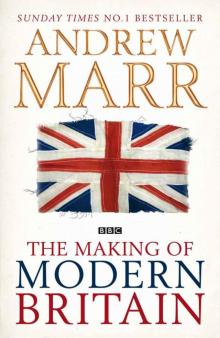 The Making of Modern Britain
The Making of Modern Britain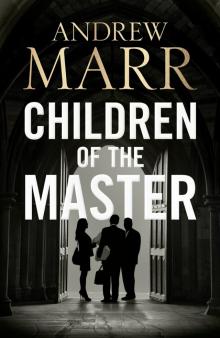 Children of the Master
Children of the Master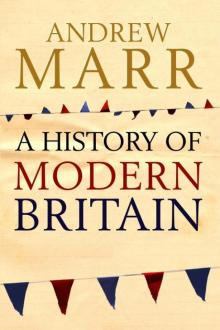 A History of Modern Britain
A History of Modern Britain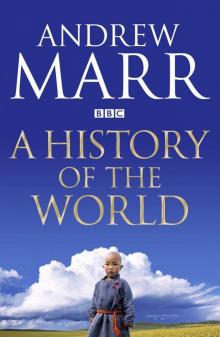 A History of the World
A History of the World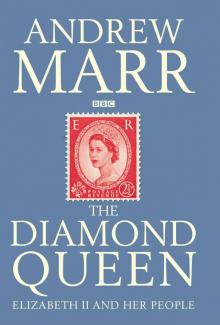 The Diamond Queen
The Diamond Queen